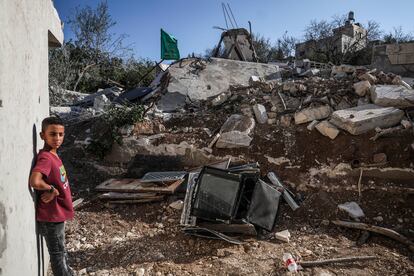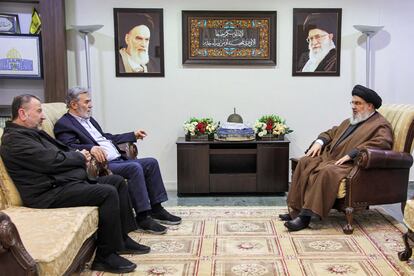Israel blows up home of Hamas deputy leader, rousing stronger support for Palestinian militia
The Israeli army has demolished the West Bank house of Hamas’ exiled No. 2, Saleh al-Aruri, but locals and relatives say that this has only made the militant group more popular

Israel is not only killing Hamas leaders with bombs in Gaza as part of its campaign to liquidate the Islamist organization after the October 7 massacre. It is also destroying symbols of the Islamist militia. This happened at dawn Tuesday in the town of Arura, in the occupied West Bank, when the Israeli army demolished the home of Hamas senior leader Saleh al-Aruri, who lives in Lebanon. A group of soldiers used explosives to blow up the house and filmed the demolition to maximize its impact. Israel’s plan is to destroy the political and weapons structure of Hamas. But, according to what was observed in Arura, after 9,000 reported deaths in Gaza, erasing the fundamentalist militia’s ideology from Palestinians’ mind will be no easy feat.
This is attested to by the testimonies collected by EL PAÍS in that town, located about 15 miles north of Ramallah, the administrative capital of the Palestinian National Authority. “After the demolition of his house, only stones remain, but that gives us strength and people support Hamas more. Events like this make people see the humiliation with their own eyes. Young people feel aggression near to them. They demolish homes, they invade us… everything leads to Hamas having more support,” says Um Quteiba, 52, the sister of Saleh al-Aruri.
At first glance, her half smile and near emotionless voice gives no indication of the visceral hatred that, over the decades, has permeated both sides. “Hamas’s popularity has grown after October 7,” she says, referring to the Hamas attack that the group’s armed wing carried out in Israeli territory, which killed 1,400 people, most of them civilians, according to local authorities. “The [Israelis] can consider whatever they want. I am Saleh al-Aruri’s sister and, no matter what happens, I will continue to be his sister,” she adds.

Over the rubble of what was once Saleh al-Aruri’s home flies a green Hamas flag, with the shahada (Islamic profession of faith) written in white. It is one of the flags that 50 locals, many of them kids, carried during the spontaneous demonstration that broke out after the demolition. “Look, al-Aruri, we are your people on the ground,” they chanted as they headed towards the ruins of the house, which has turned into a kind of altar of resistance. A few meters away, the Israeli army had left graffiti as a reminder: Stars of David, the date of October 7 and phrases comparing Hamas to ISIS.
The house that stands on the adjacent property was also damaged in the explosion. A group of men is working to repair the home. They believe that the demolition has not weakened the foundations of Hamas, despite the fact that the movement does not have majority support in the West Bank.
“A martyr lives here,” says one of the men, explaining that one of his relatives died for the Palestinian cause. He is talking about Abdelyawad Saleh, 22, who died on July 7, according to his uncle, Ismail Saleh, 38. Ismail Saleh says that his brother, Hamdan Saleh — the father of Abdelyawad — was detained during the Israeli army’s recent raids.
Some of them are close relatives of al-Aruri. Quteiba Jasib, 35, is the son of the Um Quteiba, the Hamas leader’s sister. He says that he was taken from home in the early hours of October 20, tied up and blindfolded. He was taken with dozens of other detainees to his uncle’s home, which the Israeli army used as an interrogation center before blowing it up, according to several testimonies from residents of Arura. Jasib says that he was free five hours later, but that 27 were taken away.
For Saleh al-Aruri, the demolition has not come as too much of a surprise, given Israel’s war against Hamas. After all, demolishing homes is a common practice that Israeli authorities use against Palestinians. A video from the Israeli army shows the moment in which the home is blasted apart. Other videos show the demolition from other angles. The footage of the blast — in which no one was hurt — has been circulating via cellphones.
“All the houses in Arura are for him,” says Rami Saleh, a Palestinian soldier, in reference to Saleh al-Aruri, whom everyone calls sheik (chief) out of respect. But the Hamas leader will not need to take up the town’s offer of hospitality. He won’t be coming back to the West Bank.
Al-Aruri was released in 2010 after spending more than a decade behind bars in Israel in different stints. He was released on the condition that he go into exile. From Lebanon, al-Aruri — who was elected deputy leader in 2017 — plays a key role in Hamas’s international relations. On October 25, he held a high-level meeting in Beirut with Hassan Nasrallah, the leader of the Lebanese guerilla group Hezbollah, which Iran also supports. Ziad Nakhaleh, the secretary general of the Palestinian Islamic Jihad, also attended that meeting.

The road that winds through hills from Ramallah to the north passes through an Israeli military checkpoint, where young soldiers ask for papers and others point their rifles. There are also cameras that record the passing vehicles that cross land usurped from the Palestinians by Israeli settlers.
“They prohibit me from going to Al-Aqsa [Jerusalem’s main mosque] to pray while the settlers move freely,” says Um Quteiba. “The closure and blockade of Gaza have led to what happened on October 7. What do you expect from people humiliated in a big prison?”
Um Quteiba says she hasn’t spoken to her brother in about a month. “They watch us. I am 100% sure they are keeping copies of our messages. But he will always be my brother, I will always talk to him, even if they put me behind bars,” she says. “I follow the path that Saleh guides, not that of the Palestinian Authority,” she adds, referring to the West Bank government, which has been in conflict with Hamas for years.
Moments later, Um Quteiba takes out her cellphone and shows what she most treasures: a photo of the last time she was with her brother. The photo was taken last summer during the pilgrimage to Mecca, in Saudi Arabia. It is not an ordinary image, especially given the current tensions. In the photo, Um Quteiba poses in the center next to Khalil al-Hayya (high command of the Hamas political bureau), Ismail Haniyeh (overall leader of the movement), Khaled Meshaal (leader of the political bureau), Saleh al-Aruri and Izzat al Risheq (one of the founders of the political apparatus).
The woman holds the phone, as she stands at the entrance to her home, about 200 meters from where al-Aruri’s house once stood. She lets EL PAÍS see the photo, but not publish it. “They would arrest me.”
Sign up for our weekly newsletter to get more English-language news coverage from EL PAÍS USA Edition
Tu suscripción se está usando en otro dispositivo
¿Quieres añadir otro usuario a tu suscripción?
Si continúas leyendo en este dispositivo, no se podrá leer en el otro.
FlechaTu suscripción se está usando en otro dispositivo y solo puedes acceder a EL PAÍS desde un dispositivo a la vez.
Si quieres compartir tu cuenta, cambia tu suscripción a la modalidad Premium, así podrás añadir otro usuario. Cada uno accederá con su propia cuenta de email, lo que os permitirá personalizar vuestra experiencia en EL PAÍS.
¿Tienes una suscripción de empresa? Accede aquí para contratar más cuentas.
En el caso de no saber quién está usando tu cuenta, te recomendamos cambiar tu contraseña aquí.
Si decides continuar compartiendo tu cuenta, este mensaje se mostrará en tu dispositivo y en el de la otra persona que está usando tu cuenta de forma indefinida, afectando a tu experiencia de lectura. Puedes consultar aquí los términos y condiciones de la suscripción digital.









































